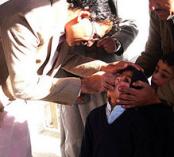
In January, IntraHealth International submitted a statement on behalf of the Safeguarding Health in Conflict Coalition to the World Health Organization’s Executive Board Meeting in Geneva. Submitted as part of agenda item 8.2, poliomyelitis, the full text of the statement is below and also published by the WHO along with other statements by NGOs that are in official relations with the WHO. IntraHealth is a steering committee member of the Safeguarding Health in Conflict Coalition.
Honorable Chair:
IntraHealth International, a US-based NGO partnering with the World Health Organization and the global health community to empower health workers, is pleased to submit this statement on behalf of the Safeguarding Health in Conflict Coalition on the need to ensure the safety of all health workers. The Safeguarding Health in Conflict Coalition is a group of over 30 organizations working together to protect health workers from violence during war and civil unrest.
Ongoing threats and attacks on Pakistan’s polio frontline vaccination workers have severely limited the country’s ability to effectively halt transmission. Targeted attacks against polio vaccinators in Pakistan and other countries have interrupted immunization efforts and resulted in the closure of critical immunization drives in polio-endemic areas.
Brutal attacks on frontline health workers have severely impacted the human resources needed to respond to global health threats— as witnessed recently in South Sudan, Syria, Iraq, and beyond. These egregious assaults contribute to immediate human resource shortages and impede the ability of countries to face health challenges once stability returns. This was most recently demonstrated in Liberia, where decades of civil conflict and brutal assaults against health resulted in a largely reduced health workforce which, along with Guinea and Sierra Leone, was ill-prepared to contain the rapid spread of Ebola in 2014.
We strongly urge the WHO and its partners to reinforce their commitment to provide global leadership in ensuring health workers are protected from violence by condemning attacks, documenting incidents, and strengthening accountability mechanisms. Until the safety of frontline health workers is assured in Pakistan—and everywhere—the provision of essential care and containment of public health threats like poliomyelitis will be threatened, and the global eradication of polio will not be achieved.

